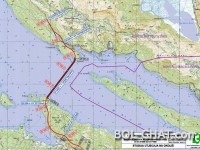Pelješac Bridge or how BiH could lose its battle for the exit to the open sea
The year 2017 should be crucial for (non) construction of the Pelješac Bridge. For Croatia, this is an absolutely undisputed project of a state in its undisputed territory, which should be paid indisputably by its own and European money. For Bosnia and Herzegovina this is a controversial object that would be from the only BH. The exit to the sea made a semi-enclosed bar, and from Neum an isolated city without the potential of maritime development.
And because of this, the Peljesac Bridge is one of the few topics that the citizens of B & H remind that they still have the sea, but which by the construction of a 375 million valuable object is prescribed a kind of death penalty.
Hands on the heart, the Croatian authorities have been listening to some objections from Sarajevo over the years, so the dimensions of the bridge, the distance of the pillars and the height itself have changed to allow the entry of large ships into the Bay of Neum. Nevertheless, what is most important, and what Zagreb ignores, is the right of BiH as a kind of maritime country to the undisturbed passage to the open sea through a corridor that has never been agreed. To this is added the still unclear border on the sea, which varies depending on whom you are asking-Sarajevo or Zagreb.
The construction of the Pelješac bridge would therefore cement the Croatian version of maritime relations with BiH due to the fact that the facility would expand Croatian sovereignty and thus make it difficult to create a corridor.
That international law is in BH. Page, shows the recent case of arbitration with Slovenia, which allowed the westernmost former Yugoslav republic to move freely to international waters.
The Pelješac bridge, potentially the most impressive bridge in this part of Europe, would extend to 2,400 meters in length, at its central part would be 55 meters high, and would have one strip in one direction. As we said, the price is 375 million euros, and the largest part of the money, about 350 million euros, is secured from EU funds. If the construction begins by the end of 2017, the opening of the bridge could be expected in 2022.
What is less known is that the Pelješac Bridge requires the construction of a new road from the Dubrovnik side, so the price rises to an enormous EUR 420 million excluding VAT.
But, as the topic re-actualized after the approved funds from Brussels in June, so did BH. The authorities remembered that they were not very straightforward with this project from the neighborhood.
At the beginning of July, MPs in the House of Representatives of BiH Parliament concluded that a note was sent to Croatia about the suspension of all works on the construction of the Pelješac Bridge until the agreement of the two countries was reached. In the second half of July, the Council of Ministers of BiH adopted the Report on activities related to the construction of the Pelješac bridge and instructed the Ministry of Civil Affairs to request from the State Border Commission a complete report on its work in relation to delineation at sea between BiH and the Republic of Croatia.
The report was due to be debated on July 26th, but due to the late delivery of documents to Members of the House of Representatives, the exact agenda was moved to the next session scheduled for September 6th.
And while waiting for MPs to come from vacation, rhythm keeps announcing a protest letter to European officials. The alleged expression of indignation should supposedly come to Valentin Inzko and Federica Mogherina.
Also, the chairman of the Main Board of the Party of Democratic Action (SDA), Halid Genjac, said today that Croatia permanently deceives the public, the UN institutions and the European Union, stating incorrect claims about the agreement of BiH. The sides to build the Peljesac bridge.
"The official position of the BiH Presidency adopted on October 17, 2007 reads: BiH opposes the construction of a bridge to resolve open issues related to the determination of the sea border line between the two countries. At the same session, Croatia was asked not to undertake any unilateral actions to build a bridge. With these official positions, the President and the Prime Minister of Croatia were acquainted in 2009, "Genjac emphasized.
Maybe it could be said that BH. Politicians take these acts as territorial sovereignty of the country when there would not have been a fact that the Pelješac bridge project had been on the table for 10 years. Did Marko arrive late in Kosovo or, in our case, Neum, we will find out by the end of the year.
<br>
- 5 Aug, 2017
- 18370 views
- No comments


